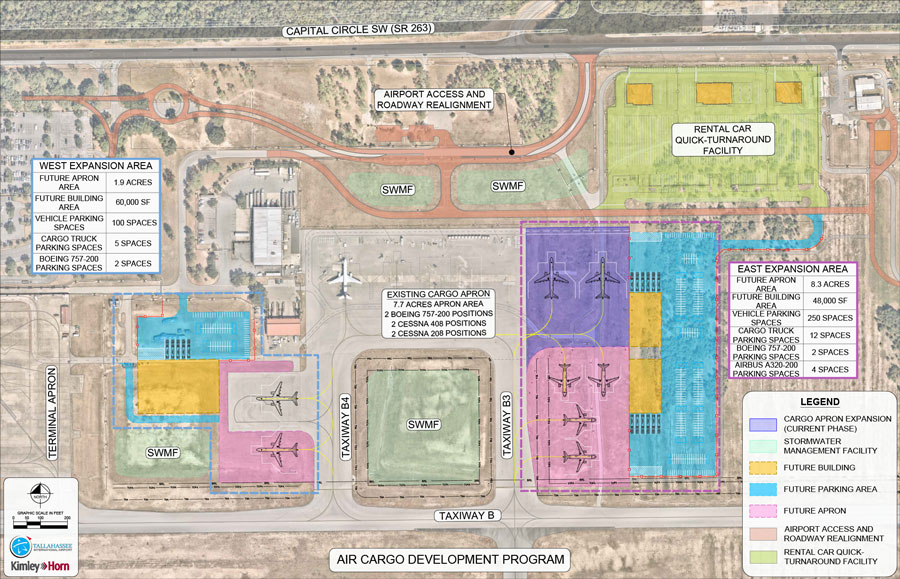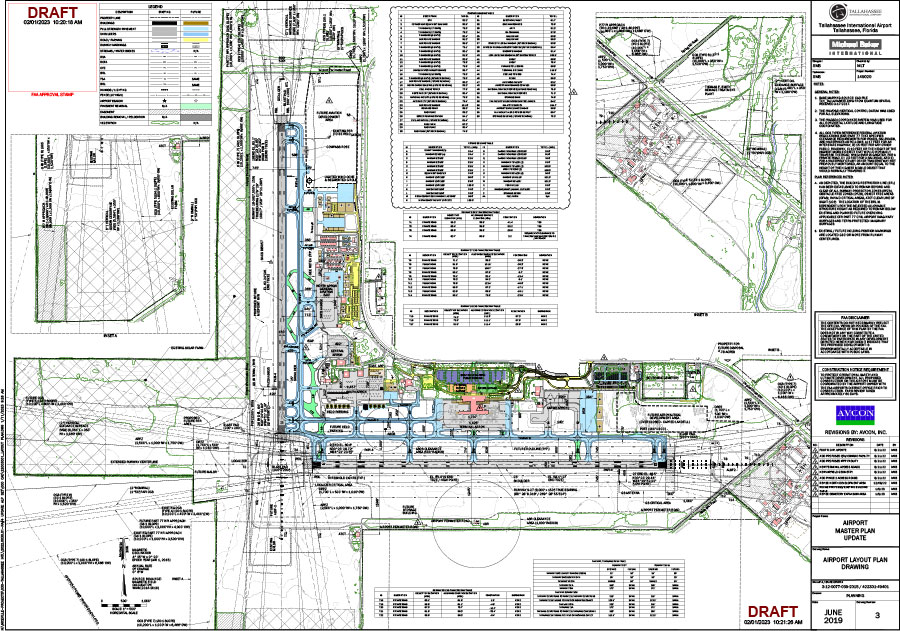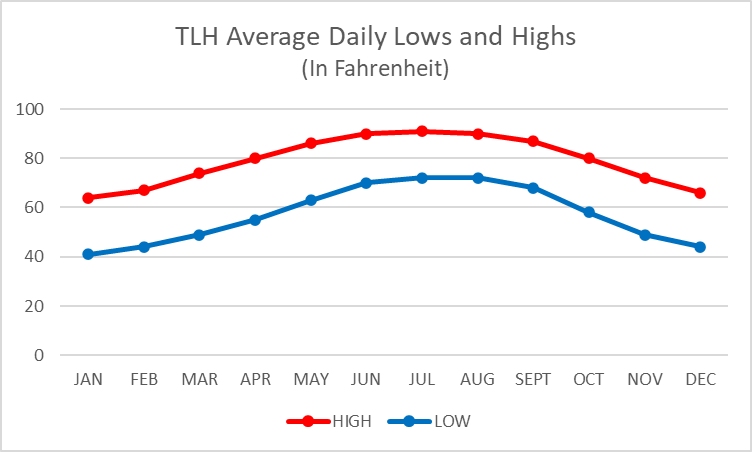International Processing Facility
International Processing Facility

Construction on the transformative $30.5 million International Processing Facility at Tallahassee International Airport is in full swing. A landmark project outlined in the City of Tallahassee’s Strategic Plan, it will modernize infrastructure, expand capacity, and drive sustained economic growth. Once complete, the facility will enable TLH to accommodate international flights and support the import and export of goods worldwide. It includes a terminal expansion featuring a U.S. Customs and Border Protection-approved international port-of-entry and a Federal Inspection Station (FIS) designed to serve both commercial and general aviation.
By opening the door to global commerce and travel, this facility is expected to significantly increase the airport’s annual economic impact to $1 billion and establish Tallahassee as Northwest Florida’s connection to international markets. Set to open in 2026, this project positions the Capital City as a competitive, innovative, and sustainable economic hub on the global stage.
Download our complete guide to the Tallahassee International Airport and surrounding benefits to learn more about how TLH moves across the globe.
For business or air service inquiries, contact us at tallahasseeinternational@talgov.com.
The Tallahassee International Airport (TLH) is located in the capital city of Florida. TLH is owned, operated and managed by the City of Tallahassee.
TLH is included in the national airport system by the National Plan of Integrated Airport Systems (NPIAS) and is designated a Non-hub Primary Commercial Service Airport by the Federal Aviation Administration (FAA). TLH is a 2,485-acre site with two all-weather non-intersecting runways, full-length parallel taxiways, three general aviation aprons, a commercial aircraft apron and a cargo apron with all-weather, 24-hour operations. TLH has uncongested airspace, which facilitates operations for carriers.
TLH is located in Northwest Florida and is conveniently situated approximately five miles from Interstate 10, a major east-west transportation route that spans from Jacksonville, Florida, to Los Angeles, California. TLH is only a six-mile drive from downtown Tallahassee and the Florida State Capitol. The airport is within five miles of two major research universities, Florida State University (FSU) and Florida A&M University (FAMU), as well as Tallahassee Community College (TCC) and Lively Technical College.
The population of the Tallahassee Metropolitan Statistical Area (MSA) is approximately 390,000 residents. Nearly 1.5 million people reside within a 90-mile radius of the airport, and TLH serves a diverse population in a 34-county area encompassing North Florida, Southwest Georgia and Southeast Alabama. TLH’s annual economic impact is nearly $600 million to the region and projected to reach $1 billion in 2024.
TLH is currently served by three airlines: American Airlines, Delta Air Lines and Silver Airways, along with six affiliate airlines: Endeavor Air, Envoy, Mesa Airlines, Piedmont Airlines, PSA Airlines and SkyWest Airlines. These airlines provide non-stop service to Atlanta (ATL), Charlotte (CLT), Dallas-Ft. Worth (DFW), Fort Lauderdale (FLL), Miami (MIA), Tampa (TPA) and Washington, D.C. (DCA).
TLH is designated by the FAA as a Non-hub Primary Commercial Service Airport, ranking 146 among more than 500 commercial service airports (CY 2021 Ranking) with 819,009 total passengers in CY 2022.
TLH is a 2,485-acre site with two all-weather non-intersecting runways, full-length parallel taxiways, three general aviation aprons, a commercial aircraft apron and a cargo apron with all-weather, 24-hour operations.
Runway 9-27, TLH’s primary runway, is an 8,000 by 150-foot grooved asphalt runway with 25-foot paved shoulders, in good condition. The runway is marked for precision approaches at both ends. The runway has a Category II Instrument Landing System (ILS) with High Intensity Runway Lights (HIRL), edge and centerline lights, Touchdown Zone Lights (TDZ) and an Approach Light System with Sequenced Flashing Lights (ALSF 2) on the Runway 27 end. There are also Precision Approach Path Indicators (PAPI) on both ends. The runway has a full-length parallel taxiway with six connector taxiways. The taxiways have full-length centerline lights and edge lights where needed for additional safety. All connectors have in-pavement sequenced flashing runway guard lights to help prevent runway incursions.
Runway 18-36 is a 7,000 by 150-foot grooved asphalt runway with 25-foot paved shoulders. The runway is marked for precision approaches at both ends. The runway has a Category I ILS, with HIRL on the edge, and a Medium Intensity Approach Light System with Runway Alignment Indicators (MALSR) on Runway 36. There are also PAPIs on both runway ends. The runway has a full-length parallel taxiway with 10 connector taxiways that have full-length edge lights.
- There are eight IFR approaches to the various runways including:
- • ILS Cat II Runway 27
- • ILS Cat I Runway 36
- • VOR/DME or TACAN Runway 36
- • VOR Runway 18
- • RNAV/GPS (LPV) Runway 9
- • RNAV/GPS (LPV) Runway 18
- • RNAV/GPS (LPV) Runway 27
- • RNAV/GPS (LPV) Runway 36
TLH obtained its Federal Aviation Regulations (FAR) Part 139 Certification in May 1973 and undergoes an annual inspection by the FAA to keep the certification current.
TLH is the site of an emerging International Port of Entry. TLH received conditional approval from U.S. Customs and Border Patrol (CBP) to be designated as a User-Fee Airport. Construction of a 40,000-square-foot world-class Federal Inspection Services (FIS) Facility is underway, with completion expected in second quarter of 2025. The FIS will meet all CBP design standards and is designed to process 200 passengers per hour. To align with the opening of the FIS, TLH will be home to a fully operational Foreign Trade Zone (FTZ) with CBP oversight that will serve up to nine surrounding counties from roughly Interstate 75 to Port St. Joe, Florida. The new FTZ will encourage international commerce, stimulate the economy and bolster the Northwest Florida region’s global market competitiveness. As a significant catalyst for economic growth, the FTZ is projected to create 1,664 jobs over the next 10 years and generate $304.7 million in annual economic impact once full maturity is reached in 2034.
Florida Foreign Trade Zone Map
TLH is the Northwest Florida region’s primary cargo facility and is committed to expanding and sustaining its support of air cargo services worldwide. The airport is well-positioned to serve our growing economy’s transportation and logistics needs.
TLH is located only three miles from Tallahassee’s Innovation Park, North Florida’s premier research and development park. Innovation Park includes over 17 buildings and houses 30 organizations ranging from university research facilities to specialty manufacturing companies and state and federal government research spaces. Notably, Innovation Park is home to the National High Magnetic Field Laboratory (MagLab), funded by the National Science Foundation and the State of Florida. The MagLab is the largest and highest-powered magnet lab in the world and the only facility of its kind in the United States. Danfoss Turbocor, a global leader in oil-free centrifugal compressors for the HVAC industry, chose Tallahassee as its North American headquarters in 2011. The Florida Center for Advanced Aero-Propulsion (FCAAP), specializing in wind tunnel research, is also located in Innovation Park.
For more information on Innovation Park, MagLab and the Tallahassee-Leon Office of Economic Vitality visit the following links:
Innovation Park
National High Magnetic Field Laboratory (MagLab)
Office of Economic Vitality
Plans are currently underway to expand TLH’s existing air cargo site. FedEx is the airport’s existing cargo carrier on the site and leases 200,160 square feet of apron for parking and maneuvering aircraft. Future expansion of TLH’s cargo site includes the development of approximately 10 acres of apron space and 108,000 square feet of building space. The expanded cargo apron will share apron access with FedEx.
The rendering below shows TLH’s planned Air Cargo Apron Expansion Project:

Final TLH Cargo Expansion Concept
The draft Airport Layout Plan below is pending FAA review:

TLH Updated ALP
Average monthly high and low temperatures for TLH are shown in the chart below.

TLH has excellent wind speeds for aircraft operations with wind speeds below 10 knots 99.5% of the time for all-weather conditions and 99.3% of the time for IFR conditions. Wind speeds are below 16 knots 99.1% of the time for all-weather conditions and 99.8% of the time for IFR conditions.
For additional information on Tallahassee weather, click on the link below:
Local Weather Information
Tallahassee offers a major talent pipeline with the co-location of two major research universities, Florida State University (FSU) and Florida A&M University (FAMU), as well as Tallahassee Community College (TCC) and Lively Technical College. TLH is located within five miles of FSU, FAMU, TCC and Lively. These educational partners have ensured that transportation, freight and logistics companies are supported at all levels by providing a highly skilled workforce. With a commitment to build our local talent pipeline, more of the 70,000 college students who live here are choosing to stay and start their lives in our community, enhancing an already strong workforce.
For additional information on the local workforce and other economic development information, click on the link below:
Office of Economic Vitality
|